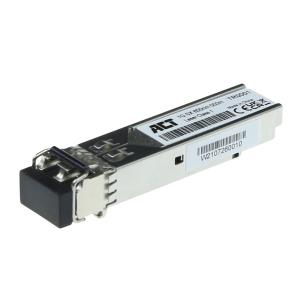

-Open coding / uncoded
-Speed 1.25Gbps, suited for multimode cable
-DDM support for monitoring SFP module
-5 years warranty
Why choose ACT Optics?
ACT was established to provide users with a brand for highly reliable and consistent quality cabling and networking products. ACT solutions mix and match seamlessly with other brands.
Why do more and more companies choose ACT?
- Consistent quality guaranteed
- Complete range of connectivity products
- Meets international standards to ensure compatibility with other brands
- Over one million connectivity products in stock
- 5-year warranty
ACT SFP modules also offer:
- DDM; ability to have diagnostic data from the module read by the switch such as power consumption, temperature, any errors etc.
- Compatibility; modules that are coded offer 100% brand compatibility.
- Packaging; each module is individually packaged.
- 5 years warranty.
- Technical support from experienced staff.
Coding and compatibility
This model SFP module works well with ACT equipment. This model SFP module has no specific coding for compatibility, this is also called open or generic coding. Many manufacturers including ACT work with open coding, SFP modules with open coding are interchangeable. Well-known brands in the field of network and telecom equipment often require coding in order for an SFP module to be compatible with the brand. For 100% compatibility ACT offers coded SFP modules. For questions about coding and compatibility please contact our team.
The 3 advantages of SFP modules
The 3 biggest advantages of using SFP fiber modules are:
1. Standardization
2. Flexibility
3. Continuity
1. SFP modules are the standard for fiber optic communication
Manufacturers of network equipment support the SFP, SFP+ and QSFP standards. SFP modules are used in different devices such as switches, routers, firewalls, servers and storage devices. These devices are equipped with a port where an SFP module can be plugged in. The abbreviation SFP stands for Small Form Factor Pluggable.
The standard for the use of SFP modules was established in cooperation with the various manufacturers. This standard is therefore called an MSA, which stands for Multi-Source Agreement.
2. SFP modules ensure maximum flexibility in a fiber optic network
A fiber optic cable is connected to an SFP module, which is plugged into the switch. The SFP module serves as an interface between the fiber optic cable and the connected equipment. This ensures maximum flexibility, as the SFP can be exchanged without having to exchange or replace the equipment in question.
Situations where only the SFP module needs to be exchanged, rather than the equipment:
- Transition to a network with a different type of fiber; for example, from single-mode to multimode.
- Changing distances: for example, from 100 meters to 80 kilometers.
- Change to another speed; for example, if the speed of the switch changes from 1G to 10G.
- Different type of fiber optic connector; for example, if instead of an LC, an SC connector is placed on the cabling.
3. Continuity in the network by using hot swappable optics
In case of changes in fiber type, distance, speed and connector, the SFP module is replaced. An important advantage is that the equipment does not have to be switched off or restarted when the SFP modules are installed, which ensures excellent network continuity. Keeping equipment operational while placing and/or replacing fiber optic (SFP) modules is called "Hot swappable".
How do I clean SFP modules?
A large percentage of outages in fiber optic networks are solved by cleaning the cabling and the optics. We advise you not to allow SFP modules to become dirty by only using cables with cleaned connectors. If this model of SFP module does need to be cleaned, the ACT One click cleaner LC is suited for this.
Fiber optic
1250 Mbit/s
SFP
Y
LC
550 m
850 nm
Y
85369010
70 °C